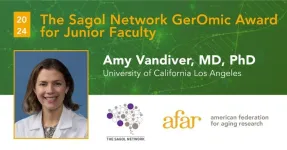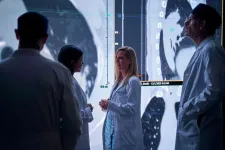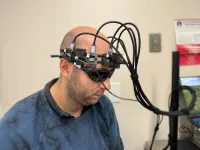(Press-News.org) NEW YORK — The American Federation for Aging Research (AFAR) is pleased to announce the recipient of the 2024 Sagol Network GerOmic Award for Junior Faculty: Amy Vandiver, MD, PhD, Clinical Instructor Clinician-Investigator Track, University of California Los Angeles. Established in 2020, the Sagol Network GerOmic Award for Junior Faculty is a one- to two-year award given to junior faculty (MDs and PhDs) to conduct aging-related Omics (GerOmics) research.
Omics is a rapidly evolving, multi-disciplinary, and emerging field that encompasses genomics, epigenomics, transcriptomics, proteomics, and metabolomics. Each of these fields offers the possibility to understand and view biology from a global perspective in a way that was previously unthinkable. Given the biological complexity and heterogeneity of the aging process, omics research can play an important role in providing important insights into the aging process and many age-related diseases.
Dr. Vandiver’s funded project is titled “Mitochondrial transcripts: a novel metric of aging in RNA-sequencing data.” Dr. Vandiver will evaluate a potential broadly applicable aging metric and will directly test the transcriptomic consequences of elevated mitochondrial deletion mutations. Insight into both questions has the potential to advance our understanding of the role of these changes in the biology of aging and move towards targeted interventions.
“GerOmics research is essential to help unfold the complexity of biology of aging,” says Stephanie Lederman, EdM, Executive Director, AFAR. “AFAR is pleased to continue our collaboration with the Sagol Network to encourage early career investigators to focus their research on this vital emerging field."
Learn more about AFAR’s Sagol Network GerOmic Award for Junior Faculty here.
###
About AFAR - The American Federation for Aging Research (AFAR) is a national non-profit organization that supports and advances pioneering biomedical research that is revolutionizing how we live healthier and longer. For more than four decades, AFAR has served as the field’s talent incubator, providing $212,500,000 to 4,460 investigators at premier research institutions to date—and growing. In 2024, AFAR expects to provide approximately $12,270,00 to 60 investigators. A trusted leader and strategist, AFAR also works with public and private funders to steer high quality grant programs and inter-disciplinary research networks. AFAR-funded researchers are finding that modifying basic cellular processes can delay—or even prevent—many chronic diseases, often at the same time. They are discovering that it is never too late—or too early—to improve health. This groundbreaking science is paving the way for innovative new therapies that promise to improve and extend our quality of life—at any age. Learn more at www.afar.org.
About the Sagol Network
The Sagol Network was set up by the Sagol Family with a vision to support and accelerate advanced research, education and therapy in the fields of Neuroscience & Healthy lifespan. Under the leadership of Sami Sagol, the family set up a virtual network of schools & research centersbased in leading academic and medical institutions promoting multidisciplinary projects, laboratories, and technologies. Among these, The Sagol School of Neuroscience at Tel Aviv University, Joseph Sagol Neuroscience Center at Sheba Medical Centre, Sagol Institute for Longevity Research, Weizmann Institute, The Sagol Center for Neurobiology & Ethology and Emily Sagol Center for Creative Art Therapy at Haifa University, Sagol Healthy Human Longevity Center at Bar-Ilan University, Sagol center for Brain & Mind at the IDC , The Sagol Brain center at Sourasky (Tel Aviv) medical center, The Sagol program for computational healthcare at Hebrew University, Kahn-Sagol-Maccabi Health Data Science Institute and The Sagol Center for Hyperbaric Medicine & Research at Shamir Medical Center. The Sagol Network’s philanthropic efforts have also extended to 'bridge' & promote collaborations between Ivy league institutions throughout the world, with initiatives such asSagol MIT-Weizmann Bridge program, Sagol-Kandel Brain Longevity Initiative at Columbia University, and The Sagol Center for Epigenetics of Metabolism and Aging between Monash University, in Sydney and Tel Aviv Medical Center. The Sagol Network GerOmic Awards for Junior Faculty with American Federation for Aging Research exemplify the Sagol Network’s global approach.
END
WASHINGTON, September 30, 2024 — An accelerated course of radiation therapy does not increase complications for patients who undergo breast reconstruction following a mastectomy, new research shows. Findings of the large, phase III RT CHARM trial (Alliance A221505) will be presented today at the American Society for Radiation Oncology (ASTRO) Annual Meeting.
While radiation therapy following mastectomy to remove breast cancer is known to improve survival rates for certain patients who are at higher risk of recurrence, RT CHARM is the first multi-institutional international study to show that a shorter course ...
WASHINGTON, September 30, 2024 — People with low- and intermediate-risk prostate cancer treated with either of two types of contemporary radiation therapy — proton beam therapy or intensity modulated radiation therapy (IMRT) — achieved equally high rates of tumor control with no differences in patient-reported quality of life, according to a first-of-its-kind phase III clinical trial comparing the two technologies. Findings of the PARTIQoL trial will be presented today at the American Society for Radiation Oncology (ASTRO) Annual Meeting.
“We tested two contemporary, advanced forms of external ...
WASHINGTON, September 30, 2024 — People with limited-stage small cell lung cancer may benefit from adding immunotherapy to chemoradiation, but not if both treatments are given at the same time, new research finds. The results suggest that the timing of when immunotherapy is given plays a key role in its ability to extend survival. Findings of the multi-institutional phase III trial, which also found that twice-daily radiation treatments offer greater survival benefits than once-daily treatment, will be presented today at the American Society for Radiation Oncology (ASTRO) Annual Meeting.
The ...
WASHINGTON, September 30, 2024 — Researchers looking to de-intensify radiation treatments for people with early-stage, HPV-associated oropharyngeal cancer to prevent long-term side effects halted a large, randomized phase II/III trial after patients in the control arm reached a record high, two-year progression-free survival rate of 98%. De-intensified treatments involving a lower radiation dose and immunotherapy in place of chemotherapy did not perform as well as the more rigorous chemoradiation approach. Findings of the NRG Oncology HN005 trial will be presented today at the American Society for Radiation Oncology (ASTRO) Annual ...
(WASHINGTON – September 30, 2024) In the largest prospective study to date examining the use of chimeric antigen receptor (CAR)-T therapy in a community setting on an outpatient basis, patients with relapsed or refractory large B-cell lymphoma (LBCL) responded well to treatment with few serious side effects, according to results published today in Blood Advances.
LBCL is a cancer affecting B lymphocytes, a type of white blood cell. It can progress rapidly and is fatal if untreated, although most forms of LBCL respond well to standard ...
LOS ANGELES — City of Hope®, one of the largest and most advanced cancer research and treatment organizations in the U.S. and ranked among the nation’s top 5 cancer centers by U.S. News & World Report, is part of today’s press conference program at the American Society for Radiation Oncology (ASTRO) Annual Meeting, where a renowned City of Hope radiation oncologist will present phase 3 clinical trial data showing that people with limited-stage small cell lung cancer may benefit from adding immunotherapy to chemoradiation, but not if both treatments are given at the same time. The results suggest that the timing of when immunotherapy is given plays a key role in its ...
Like atoms coming together to release their power, fusion researchers worldwide are joining forces to solve the world’s energy crisis. Harnessing the power of fusing plasma as a reliable energy source for the power grid is no easy task, requiring global contributions.
The Princeton Plasma Physics Laboratory (PPPL) — a U.S. national laboratory funded by the Department of Energy (DOE) — is leading several efforts on this front, including collaborating on the design and development of a new fusion device at the University of Seville in Spain. The SMall Aspect Ratio Tokamak (SMART) strongly ...
People who have been fully vaccinated against COVID-19 have a significantly lower risk of developing more severe cardiovascular conditions linked to COVID-19 infection, according to a nationwide study at the University of Gothenburg. At the same time, some cardiovascular effects are seen after individual doses of the vaccine.
The COVID-19 vaccine aims to reduce complications and overall mortality from the disease. At the same time, some cardiovascular effects have been seen after individual doses of the vaccine. A rare acute side effect is inflammation of the cardiac muscle or the pericardium in young men following mRNA vaccination. In terms of other cardiovascular ...
When physicians want to know more about a patient’s risk of cardiovascular disease, they can order a cardiac stress test. But when it comes to risk of stroke, there is no equivalent scalable and cost-effective test of the brain’s function to help physicians counsel patients on their potential risk. A questionnaire that asks patients about contributing risk factors is currently the best tool for estimating such risk.
Now a team of engineers and scientists from Caltech and the Keck School ...
CLEVELAND—With a four-year, $3.3 million grant from the National Institutes of Health (NIH), researchers from Case Western Reserve University will study whether certain brain proteins may play a role in the development of Alzheimer’s disease.
Alzheimer’s disease is a brain disorder that slowly destroys memory and thinking skills. According to the Alzheimer’s Association, nearly 7 million Americans 65 and older are living with the disease and there are more deaths from Alzheimer’s than breast and prostate cancer combined.
Previous research has ...





